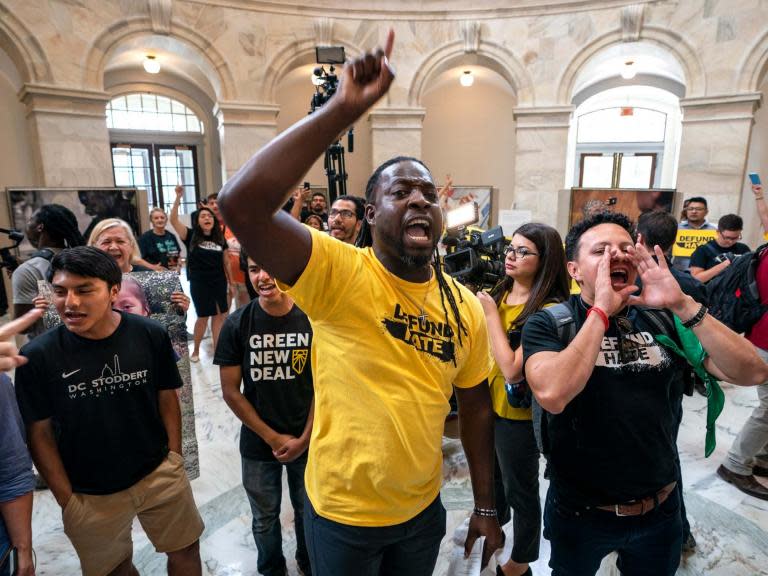Democrats approve $4.5bn border aid proposal to rein in Trump’s immigration crackdown
A divided House voted on Tuesday to send $4.5bn (£3.5bn) in humanitarian aid to the border to address horrific conditions facing a crush of migrants, attaching significant rules on how the money could be spent in the first action by Democrats to rein in Donald Trump’s immigration crackdown.
But the package — which passed by a vote of 230-195 nearly along party lines, only after Democratic leaders toughened restrictions on the money to win over liberal sceptics — faces a tough path to enactment.
A similar measure with many fewer strings binding Mr Trump has drawn bipartisan support in the Senate. And the House bill faces a veto threat from White House advisers, who regard the Senate bill as the surest way to speed the needed aid to strapped agencies dealing with the migrant influx.
Hours before the House bill passed, Mr Trump said he did not like some of the restrictions that lawmakers were seeking to place on the humanitarian funding but said he badly needed the resources.
“There are some provisions, I think, that actually are bad for children,” Mr Trump said in an interview for a coming book about his immigration policies. “There are a couple of points that I would like to get out of it, but I also have to get the money to be able to take care of children and families.”
While the House debated, the administration again overhauled the leadership responsible for border policies, naming an immigration hard-liner and former Fox News contributor as acting commissioner of Customs and Border Protection.
The new acting commissioner, Mark Morgan, has been pushing for the nationwide deportation raids that the president delayed last week. The move continued the turmoil at the Department of Homeland Security, whose senior ranks were purged two months ago.
House Democrats, in approving the aid package, said they were finally acting to block what they saw as Mr Trump’s cruelty on the border.
“The president’s cruel immigration policies that tear apart families and terrorise communities demand the stringent safeguards in this bill to ensure these funds are used for humanitarian needs only — not for immigration raids, not detention beds, not a border wall,” said representative Nita M Lowey, chairwoman of the House Appropriations Committee.
The back-and-forth over the measure highlighted the bitter partisan strife as well as the internal divisions in both parties incited by the president’s immigration agenda, which have been placed in stark relief this week by disturbing images of migrants living in squalor and inhumane conditions. An Associated Press photograph that surfaced on Tuesday of the drowned bodies of a man and his toddler daughter lying face down on the banks of the Rio Grande further inflamed the debate.
Speaker Nancy Pelosi faced a mini-rebellion in her ranks over the aid measure, with many liberals and Hispanic lawmakers arguing that any bill that sent money to the agencies that have carried out Mr Trump’s harsh immigration tactics would enable his agenda.
Democratic leaders won over many of their reluctant colleagues by tacking on additional health and safety standards and requirements for children and adults held by the government, as well as time limits for holding unaccompanied minors.
Still, four Democrats voted no: representatives Alexandria Ocasio-Cortez, Ilhan Omar, Ayanna Pressley and Rashida Tlaib. The lawmakers, all freshmen, have quickly made names for themselves as outspoken progressives willing to buck their party, often as a bloc.
Republicans were almost uniformly opposed to the bill, which they said contained too many restrictions on the power of immigration agencies and inadequate funding. Only three sided with Democrats to support it: representatives Will Hurd, whose Texas district runs along the border; Brian Fitzpatrick; and Christopher Smith.
Even as Ms Pelosi worked to quell the furore of outspoken liberals like Ms Ocasio-Cortez, members of the far-right House Freedom Caucus sat down for lunch with Mick Mulvaney, the acting White House chief of staff who was once a member of the conservative group on Capitol Hill, and the newly appointed Mr Morgan, now the acting head of Immigration and Customs Enforcement, to lobby Mr Mulvaney to oppose even the Senate’s version.
That aid package, which contains $4.6bn, would impose many fewer restrictions on the administration, but it does include some constraints on both immigration agencies, such as a limitation on sharing with immigration authorities any information about people who step forward to take custody of unaccompanied migrant children.
In the House, the outcome of the vote remained uncertain until hours before, as leaders and members of the Appropriations Committee haggled over changes needed to win support.
Some liberals remained implacably opposed.
“I don’t slight my colleagues; I don’t think anybody’s making a bad decision here,” Ms Ocasio-Cortez said. “Whenever I have these tough votes, I have to check back in with my district to see how people back home feel, and there was almost universal opposition.”
Others reluctantly went along. Representative Pramila Jayapal, D-Wash, a chairwoman of the Congressional Progressive Caucus, said she had been persuaded after reaching an agreement on the House floor with Ms Pelosi and others to include a provision that would require government contractors operating temporary shelters to meet strict standards of care within six months or lose their contract.
Efforts to meet liberal demands only bolstered House Republican and White House opposition to a spending bill that Mr Trump initially requested. But they succeeded in getting the measure through the House, sparing Democrats an embarrassing and politically damaging floor defeat.
“I’d hoped this would provide an opportunity to work together in a bipartisan manner,” said representative Tom Cole, the top Republican on the House Rules Committee. “Instead, this bill tacked further to the left, to satisfy the liberals in the Democratic caucus, who are unwilling to do anything that meets President Trump’s request.”
Critics of the package had huddled with Ms Pelosi on Monday night in her Capitol office to air their complaints, and some emerged saying changes would be needed to garner their support. Leaders met into the night to discuss those modifications and came up with a handful that they planned to add to the bill before it reached the floor on Tuesday night.
Democrats ultimately added language that would require Customs and Border Protection to establish plans and protocols to deliver medical care, improve nutrition and hygiene, and train personnel to ensure the health and safety of children and adults in custody.
Another provision would ask the secretary of health and human services to specify which requirements are being temporarily waived to deal with a sudden influx of migrants. That amendment would limit the detention-centre stay of any unaccompanied child to 90 days unless written notification is submitted to Congress attesting that no other facilities are available.
Democrats also attached requirements for translators at Customs and Border Protection, Immigration and Customs Enforcement, and US Citizenship and Immigration Services.
Senate Republicans and Democrats came together last week to draft a $4.6bn version of the humanitarian aid package that also includes limitations on the use of the funds and several other conditions.
With House Republicans almost uniformly opposed to the stricter House measure, the fate of the entire effort remains uncertain.
Ms Pelosi had argued that to give the House leverage in any such negotiation with the Senate, Democrats had to show the broadest possible support for the bill. But the nearly party-line vote only underlined the partisan split over the bill.
“I wish we could pass ours and see it go from there,” said senator Patrick Leahy, the senior Democrat on the Appropriations Committee, who forged the bipartisan deal with senator Richard Shelby, the Republican chairman of the panel. “That’s an easy way out for everybody — just pass that.”
That bill faced obstacles as well. Senator Rand Paul, R-Ky, wants a vote on language that would require that the emergency aid bill be paid for by cuts elsewhere in the federal budget. And Republicans fear that allowing one would give Democrats the opportunity to propose their own modifications, such as language to restore development aid to Central American countries that Mr Trump has revoked, according to a senior leadership aide who detailed the deliberations on the condition of anonymity.
Still, Mr Shelby said he was optimistic about the prospects for the measure.
“I believe we’ll pass it before the week’s out,” he said.
The New York Times

 Yahoo News
Yahoo News 

